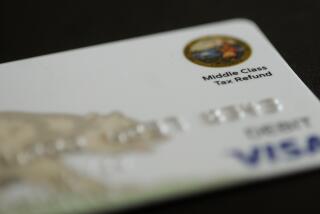Many community banks still struggle to repay TARP bailout funds
Five years after Washington bailed out more than 700 banks, the money has become a burden for more than 100 community banks that can’t seem to repay it.
About a dozen of those are in California, and they are facing increasing pressure as the federal government looks to close out the Troubled Asset Relief Program, or TARP. The banks will soon face a big increase in the annual dividend they must pay the government on its investment — to 9% from 5%. Some of the banks will have to sell out or bring in new shareholders — who might demand control of the institution in exchange for the cash infusion.
“If the question is how many of these guys are going to walk away from their debt, I don’t think that’s going to happen,” said Chief Executive Jeff Rigsby of CB Resource Inc., a San Juan Capistrano bank-consulting firm. “We do have some little guys where you wonder how they could ever recapitalize and stay independent.”
The California bank with the greatest remaining debt, L.A.’s Cathay General Bancorp, said last week that it had stamped its file “paid in full,” having saved enough profit to pay back $129 million to TARP. But it wasn’t easy.
Cathay General, the Chinatown-based parent of Cathay Bank, had received $258 million from the Treasury Department in December 2008 in return for dividend-paying preferred stock. It had bought back half the stock in March and knocked out the rest with the $129,000 payment last week.
To weather the recession, Cathay had netted $244 million on sales of new stock in late 2009 and 2010, diluting the holdings of its shareholders at the time. The bank didn’t want to have to raise more new capital to repay the government, said Heng Chen, Cathay’s executive vice president and chief financial officer.
“We’re glad it’s done,” Chen said.
That’s partly because the bank will now be able to pay incentive bonuses beyond the TARP limit of 50% of an executive’s base salary. “It gives us more flexibility for hiring a senior officer,” Chen said.
Some banks that received TARP funds failed outright, to the embarrassment of the government. The Treasury Department had said it would test most banks to ensure they were stable enough to survive even without taxpayer-funded capital infusions.
In California, these failed TARP banks included the two-branch Pacific Coast National Bank in San Clemente, which cost the Treasury Department $4.1 million, and United Commercial Bank of San Francisco, a huge Chinese American bank whose collapse wiped out a $299-million government investment.
In other cases, the Treasury Department helped negotiate deals with private investors or nonprofits that propped up banks with private capital and got the government out as an owner — but at a loss.
Ailing regional lender Pacific Capital Bancorp of Santa Barbara, for example, was taken over in 2010 by a group headed by Texas investor Gerald R. Ford. When Union Bank’s parent company bought the bank from the Ford group in December, the government got back $168.5 million, or 93% of the $180.6 million it had invested in 2008, according to Treasury Department reports to Congress.
A smaller example is Broadway Financial Corp., the parent of Broadway Federal Bank in Los Angeles, an inner-city bank that opened in 1946 to serve African Americans.
Broadway is completing a complex reorganization designed to raise more than $4 million in fresh equity capital, much of it from nonprofit economic-development organizations, CEO Wayne K. Bradshaw said. Its current debt holders are forgiving much of what they are owed.
The Treasury Department is also taking a hit: As part of the transaction, the department is trading $15 million in dividend-paying stock for $7.5 million in common stock that pays no dividend.
Approval of the agreement is pending a vote by Broadway’s shareholders. The deal required those with dividend-paying stock to agree to the same deal as the department — getting half as much common stock in return for the preferred shares.
Another Los Angeles banking company, NCAL Bancorp, is working out a similar deal in order to repay its $10 million in TARP funds.
NCAL, the parent of National Bank of California, has announced a $25-million capital commitment from private investors. Some of those funds would be used to repay the government at a discount, said the bank’s president, Henry P. Homsher.
Homsher wouldn’t disclose details of the haircut the Treasury Department would take, saying only: “We’re doing the best we can.”
In other cases, the department has sold off its stakes in small banks to the highest bidder. The latest in these transactions included the auction Monday of the agency’s shares in eight banks, including its $5.5-million investment in Valley Community Bank of Pleasanton, Calif.
By late in the day, the Treasury Department had not announced the outcome of the auction. Rick Loupe, CEO of Valley Community, couldn’t be reached for comment.
Twitter: @ScottReckard
More to Read
Inside the business of entertainment
The Wide Shot brings you news, analysis and insights on everything from streaming wars to production — and what it all means for the future.
You may occasionally receive promotional content from the Los Angeles Times.











